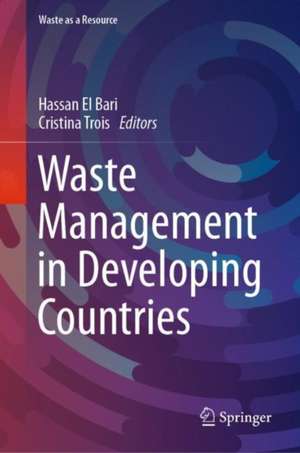Waste Management in Developing Countries: Waste as a Resource
Editat de Hassan El Bari, Cristina Troisen Limba Engleză Hardback – 2 iun 2023
Waste Management in Developing Countries will be an essential reference for researchers, scientists, and students in waste management and environmental sciences, as well as waste management practitioners, policymakers, municipal officials, and related industry professionals.
Preț: 731.28 lei
Preț vechi: 891.81 lei
-18% Nou
Puncte Express: 1097
Preț estimativ în valută:
139.93€ • 146.47$ • 116.47£
139.93€ • 146.47$ • 116.47£
Carte tipărită la comandă
Livrare economică 31 martie-14 aprilie
Preluare comenzi: 021 569.72.76
Specificații
ISBN-13: 9783031280009
ISBN-10: 3031280008
Ilustrații: X, 254 p. 60 illus., 59 illus. in color.
Dimensiuni: 155 x 235 mm
Greutate: 0.55 kg
Ediția:2023
Editura: Springer International Publishing
Colecția Springer
Seria Waste as a Resource
Locul publicării:Cham, Switzerland
ISBN-10: 3031280008
Ilustrații: X, 254 p. 60 illus., 59 illus. in color.
Dimensiuni: 155 x 235 mm
Greutate: 0.55 kg
Ediția:2023
Editura: Springer International Publishing
Colecția Springer
Seria Waste as a Resource
Locul publicării:Cham, Switzerland
Cuprins
Part 1: Waste Management Diagnostic Trends in Developing Countries.- Waste Generation and Characteristics.- Waste Collection Situation.- Waste Recycling and Recovery.- Landfill Disposal.- Waste Legislation Aspect.- Economic and Financial Aspects of Waste Management.- Part 2: Impact of Poor Waste Management in Developing Countries.- Impact on Human Health.- Impact on Water.- Impact on Soil.- Impact on Climate Change.- The Waste Informal Sector Impact.- Part 3: Towards a Good and Adequate Governance of Waste Management in Developing Countries.- Towards Improved Waste Legislation and Laws.- Appropriate Financial Instruments for Waste Management.- Waste Management Institutional Aspects.- Part 4: Appropriate Waste Technologies for Developing Countries.- Improvement of Waste Collection System.- Waste Recycling Process in Circular Economy Context.- Organic Waste Composting.- A Suitable Biochemical Conversion Technology for Organic Waste Recovery.- Thermochemical Conversion as an Organic WasteRecovery.
Notă biografică
Prof. Dr. Hassan El Bari has been a Professor at Ibn Tofail University-Morocco since 1988. He obtained a Ph.D. in Material Sciences from INPL (France) in 1987 and has a “Doctorat d’Etat” in Mechanical Engineering, University Mohamed V – Morocco, since 1998. Prof. Dr. El Bari is the President of the Moroccan Association of Solid Waste and was a member of the International Solid Waste Association (ISWA) from 2004-2014. He has been involved in many funded projects as coordinator and partner and has a long experience teaching solid waste management, biomass and bioenergy, and anaerobic digestion technology. He is an Associate Editor of the Cleaner Waste Systems Journal and a guest lecturer at the University of KwaZulu-Natal, South Africa.
Professor Cristina Trois is currently the NRF South African Research Chair in Waste and Climate Change (SARCHI) at the University of KwaZulu-Natal (UKZN). She is also a Full Professor in Environmental Engineering and the formerDean and Head of the School of Engineering. She holds an MScEng (summa cum laude) and a Ph.D. in Environmental Engineering from the Department of Geo-Engineering and Environmental Technology of Cagliari University. Professor Trois is a C1-rated scientist with the National Research Foundation. Her main fields of expertise are environmental and geo-engineering, waste and climate change in sustainable cities, waste and resources management, control, management, and treatment of landfill emissions, renewable energy from waste, greenhouse gas control from zero waste in Africa and developing countries, and alternative building materials. She is the author of over 100 publications in high-impact journals and has successfully supervised more than 60 Ph.D. and Master’s students. Professor Trois is the Chair of the joint secretariat for the Southern Africa Region of the UN-IPLA Programme (International Partnership for Advancing Waste Management Services of Local Authorities) and the IWWG (International Waste Working Group) and a Fellow of the South African Academy of Engineers.
Professor Cristina Trois is currently the NRF South African Research Chair in Waste and Climate Change (SARCHI) at the University of KwaZulu-Natal (UKZN). She is also a Full Professor in Environmental Engineering and the formerDean and Head of the School of Engineering. She holds an MScEng (summa cum laude) and a Ph.D. in Environmental Engineering from the Department of Geo-Engineering and Environmental Technology of Cagliari University. Professor Trois is a C1-rated scientist with the National Research Foundation. Her main fields of expertise are environmental and geo-engineering, waste and climate change in sustainable cities, waste and resources management, control, management, and treatment of landfill emissions, renewable energy from waste, greenhouse gas control from zero waste in Africa and developing countries, and alternative building materials. She is the author of over 100 publications in high-impact journals and has successfully supervised more than 60 Ph.D. and Master’s students. Professor Trois is the Chair of the joint secretariat for the Southern Africa Region of the UN-IPLA Programme (International Partnership for Advancing Waste Management Services of Local Authorities) and the IWWG (International Waste Working Group) and a Fellow of the South African Academy of Engineers.
Textul de pe ultima copertă
This book presents state-of-the-art solid waste management in developing countries. It outlines the impact of poor solid waste management on human health and the environment and examines appropriate solid waste management technologies for the developing world. Contributions define waste recovery in a circular economy context and the informal sector's role, describe how sustainable and integrated solid waste management in developing countries contributes to reducing greenhouse gases and their effect on climate change, and analyze the financial and legislation aspects of solid waste management.
Waste Management in Developing Countries will be an essential reference for researchers, scientists, and students in waste management and environmental sciences, as well as waste management practitioners, policymakers, municipal officials, and related industry professionals.
Waste Management in Developing Countries will be an essential reference for researchers, scientists, and students in waste management and environmental sciences, as well as waste management practitioners, policymakers, municipal officials, and related industry professionals.
- Examines potential for reducing GHG emissions through waste management;
- Looks at technology for developing countries;
- Includes waste-to-resource case studies.
Caracteristici
Examines potential for reducing GHG emissions through waste management Looks at waste technology for developing countries Includes waste-to-resource case studies

